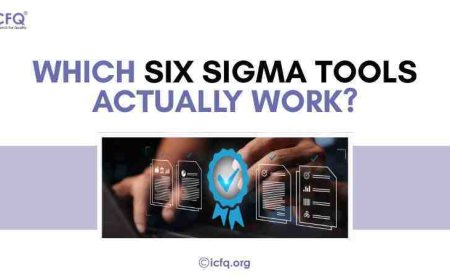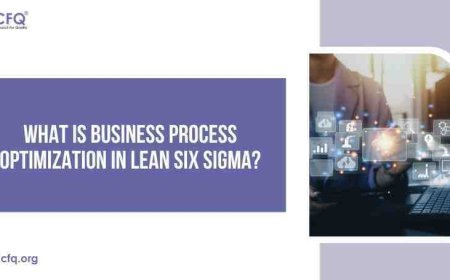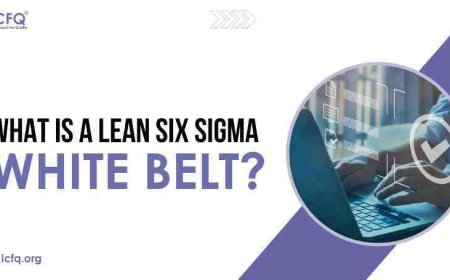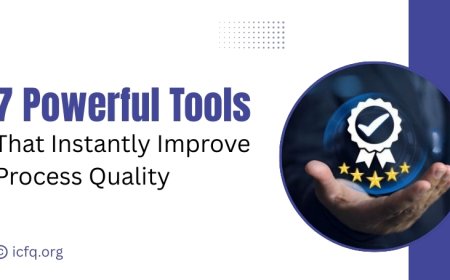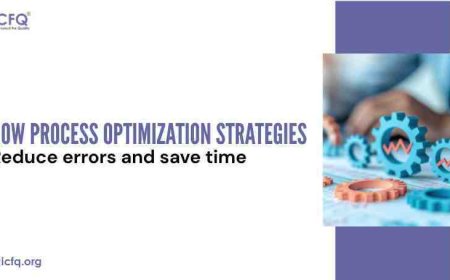Does the Six Sigma Black Belt Certification Expire?
Wondering if your Six Sigma Black Belt expires? Learn how long it lasts and what you need to keep it valid.
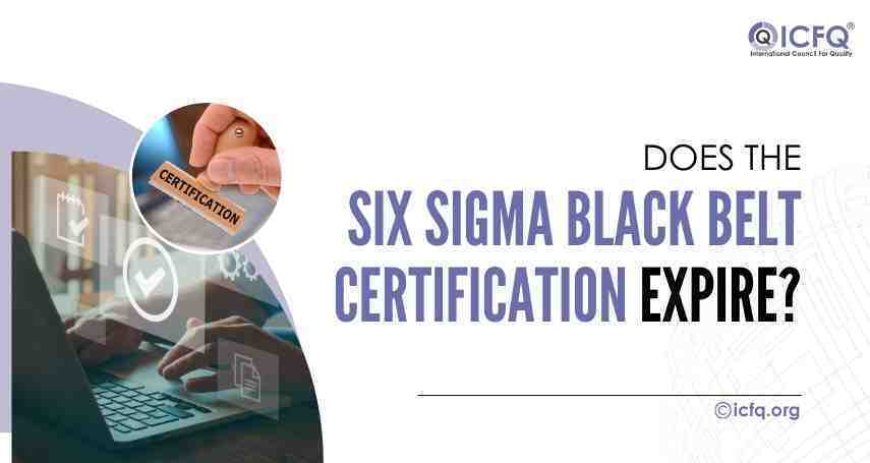
Does the Six Sigma Black Belt Certification expire? And if it doesn’t, does it still hold the same value years later?
In my experience with Six Sigma, I’ve learned that the true value of a certification goes far beyond the certificate itself. The Six Sigma Black Belt Certification may provide credibility on paper, but what counts is how consistently you apply its principles in real-world scenarios. A credential can open doors to leadership roles and career growth, yet it becomes meaningful only when paired with continuous practice and improvement.
Business challenges today are not the same as they were a decade ago; data-driven decision-making, automation, and customer-centric strategies are now central to success. That’s why Black Belt professionals who keep updating their skills remain far more effective than those who rely solely on past knowledge.
Understanding Six Sigma Black Belt Certification
The Six Sigma Black Belt Certification is a globally recognized credential that validates an individual’s expertise in process improvement, statistical analysis, and leadership. A Black Belt is not just a technical problem-solver but also a strategic leader capable of driving cross-functional projects.
The certification is typically awarded by professional bodies, universities, or training institutes, such as:
-
American Society for Quality (ASQ)
-
International Association for Six Sigma Certification (IASSC)
-
Various accredited universities and private training providers
But here’s where it gets confusing: Some certifications require renewal, while others remain valid for life. So, does it expire?
Does the Six Sigma Black Belt Certification Expire?
The answer depends on where you earned your certification.
1. ASQ (American Society for Quality): Their Six Sigma Black Belt Certification requires recertification every three years. Professionals need to either retake the exam or submit proof of continuing education/professional development activities.
2. IASSC (International Association for Six Sigma Certification): Their Black Belt Certification does not expire. However, they recommend professionals pursue periodic recertification to ensure skills stay current.
3. ICFQ (International Certification for Quality): Their Six Sigma Black Belt Certification is generally valid for life. While it does not officially expire, ICFQ strongly encourages certified professionals to continue engaging in projects and training to stay relevant in global standards.
4. Corporate or University Programs: Some in-house certifications, like Motorola’s original Black Belt training, are valid for life. But companies may require employees to demonstrate ongoing project involvement.
So, technically, the Six Sigma Black Belt Certification itself may or may not expire. What matters more is how relevant and updated your knowledge is.
Why Renewal Matters Even if Certification Doesn’t Expire
Even if your Six Sigma Black Belt Certification is considered “valid for life,” your knowledge and skills are not permanent. The world of business, technology, and quality management changes constantly, and professionals who don’t keep pace may find their certification losing value over time.
Today, process improvement is no longer limited to traditional manufacturing setups. It has expanded into areas like IT, finance, healthcare, supply chain, and even customer experience management. To stay competitive, certified Black Belts must show that they can adapt Six Sigma principles to modern challenges.
Some of the biggest shifts include:
-
AI-driven process automation: Machine learning and predictive analytics are now being used to detect process inefficiencies faster than ever. A Black Belt who can integrate Six Sigma with AI tools brings far greater value to an organization.
-
Lean Six Sigma + Agile methodologies: Businesses increasingly combine continuous improvement with Agile frameworks to deliver faster results in shorter cycles. Knowing how to balance structured Six Sigma DMAIC with Agile sprints is a key differentiator.
-
Advanced data visualization tools: Platforms like Power BI, Tableau, and Python-based analytics allow professionals to present data-driven insights in a clear, real-time manner. Black Belts who master these tools can influence decisions at the executive level.
Employers today don’t just want someone who “has a certificate.” They want evidence of applied expertise. A certification earned 10 years ago, without renewed practice or updated learning, does not carry the same weight as one that is backed by recent project work, continuous education, or recertification.
Benefits of Recertification
-
Skill Relevance – Recertification ensures you stay current with the latest Six Sigma tools, statistical methods, and digital innovations. For example, many modern Six Sigma projects now integrate automation, AI-driven analytics, and advanced visualization platforms.
-
Career Growth – Employers are increasingly selective about who they hire for leadership and process improvement roles. A Six Sigma Black Belt Certification earned years ago may still be valid, but a recently renewed one signals that you are actively developing your expertise.
-
Global Recognition – Professional bodies like ASQ, IASSC, and ICFQ are recognized worldwide, and their recertification standards are designed to align with international quality management expectations. By keeping your certification updated, you demonstrate that your skills are not only valid locally but also competitive on a global scale. This is especially important for professionals aiming to work with multinational organizations.
-
Competitive Advantage – In a crowded job market, many candidates may hold a Six Sigma Black Belt Certification. However, not all of them are current. By renewing your credential, you distinguish yourself as someone committed to lifelong learning and continuous improvement.
How to Maintain Your Six Sigma Black Belt Certification
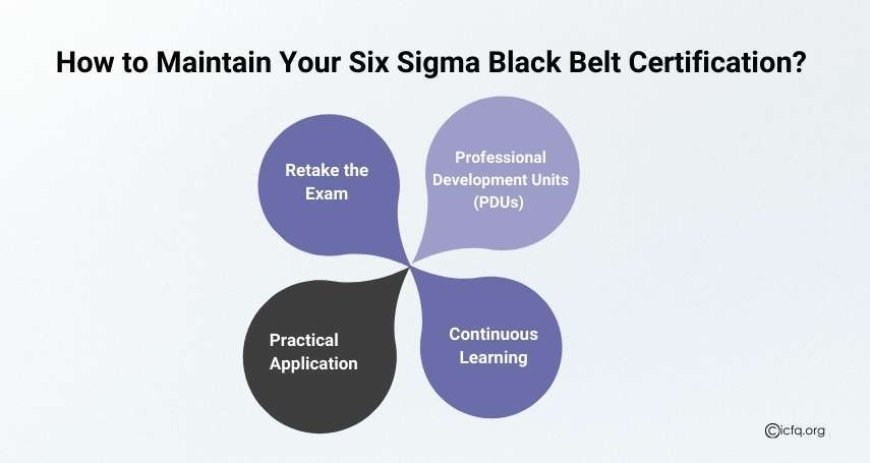
If your certification body requires renewal, here’s how to stay compliant and ensure your credential continues to add value to your career:
-
Retake the Exam – Many professional bodies, such as ASQ, require recertification through a re-exam every three years. This process verifies that you not only remember core concepts but can also apply them to today’s business challenges. While exams can feel like a hurdle, they act as a structured way to assess whether your skills match current industry standards. Preparing for the re-exam also forces you to review key Six Sigma principles, keeping your knowledge fresh.
-
Professional Development Units (PDUs) – Instead of retaking exams, some organizations allow professionals to renew their certification through PDUs or Continuing Education Units (CEUs). This can be achieved by attending workshops, webinars, or specialized training programs. For example, ASQ allows you to submit proof of professional development activities such as publishing articles, presenting at conferences, or even teaching Six Sigma courses.
-
Practical Application – Certification bodies and employers alike value professionals who actively use Six Sigma in real-world projects. By leading and documenting process improvement initiatives, you not only demonstrate continued competency but also strengthen your portfolio. For instance, spearheading a cost-reduction project or improving customer service metrics in your organization can count as proof of ongoing application of Six Sigma Black Belt Certification skills.
-
Continuous Learning – Six Sigma does not exist in isolation. As business ecosystems evolve, professionals are encouraged to upgrade their expertise. Enrolling in programs like Lean Six Sigma Master Black Belt, Agile Project Management, or Data Analytics certifications keeps you versatile.
Why Employers Trust Six Sigma Black Belts
Employers don’t just look at your certification; they look at how effectively you can apply Six Sigma principles to drive measurable business results. A Six Sigma Black Belt is often seen as a change leader, so organizations expect a mix of technical, analytical, and leadership skills.
-
Strong Problem-Solving Skills – Employers expect Black Belts to lead projects that reduce defects, improve efficiency, and save costs. They must apply DMAIC, statistical tools, and root cause analysis with precision.
-
Business Impact – It’s not enough to complete projects; organizations want results. Black Belts are expected to demonstrate quantifiable savings, such as reducing production costs, improving customer satisfaction scores, or cutting down process cycle time.
-
Leadership and Mentoring – Black Belts are seen as mentors for Green Belts and team members. Employers want professionals who can coach teams, handle resistance to change, and inspire a culture of continuous improvement.
-
Adaptability to Modern Tools – With digital transformation, Black Belts are expected to use tools like Power BI, Tableau, and Minitab, along with integrating Six Sigma into Agile or Lean environments. Employers value those who can bridge traditional process improvement with modern analytics.
-
Strategic Thinking – Beyond project-level improvements, organizations expect Black Belts to align initiatives with broader business goals, whether it’s increasing profitability, achieving compliance, or improving customer trust.
Earning a Six Sigma Black Belt Certification is a milestone achievement, but staying relevant requires ongoing learning. Whether your credential officially expires or not, employers expect you to demonstrate up-to-date skills in process improvement, leadership, and analytics.
Your certificate may last forever, but your career growth depends on how you keep your knowledge alive.


